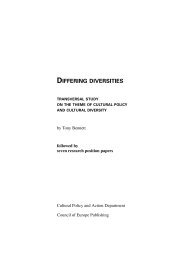Why we need European cultural policies: the impact of EU ...
Why we need European cultural policies: the impact of EU ...
Why we need European cultural policies: the impact of EU ...
Create successful ePaper yourself
Turn your PDF publications into a flip-book with our unique Google optimized e-Paper software.
Fragile <strong>cultural</strong> marketsThere is an ongoing debate in Europe, not only about <strong>the</strong> future <strong>of</strong> <strong>cultural</strong> and media policy in<strong>the</strong> light <strong>of</strong> <strong>the</strong> <strong>EU</strong>’s streng<strong>the</strong>ning <strong>of</strong> competition law, but also about <strong>the</strong> <strong>impact</strong> <strong>of</strong> <strong>the</strong> WorldTrade Organization’s measures to liberalize trade. Ho<strong>we</strong>ver, so far, <strong>the</strong>re has been no specialconsideration for <strong>the</strong> fragile <strong>cultural</strong> markets in <strong>the</strong> new member states. Western <strong>European</strong>countries, with a long tradition <strong>of</strong> <strong>the</strong> market economy, are always on <strong>the</strong> lookout for innovative<strong>policies</strong> that will reverse <strong>the</strong> historical trade deficit in <strong>the</strong> import/export <strong>of</strong> <strong>cultural</strong> goods andservices, but it is easy to understand why such topics are only beginning to be discussed in <strong>the</strong>transition countries.Most <strong>of</strong> <strong>the</strong> new member states have focussed, up to now, on issues such as preserving andreforming <strong>the</strong>ir <strong>cultural</strong> infrastructure, on <strong>the</strong> functioning <strong>of</strong> specific <strong>cultural</strong> policy areas and on<strong>the</strong> search for additional and alternative sources <strong>of</strong> funding. They have had little time or energywith which to fine-tune <strong>cultural</strong> <strong>policies</strong> to <strong>the</strong> rules <strong>of</strong> <strong>the</strong> market economy, nor to develop <strong>policies</strong>that will balance <strong>the</strong> <strong>cultural</strong> and economic aspects <strong>of</strong> <strong>cultural</strong> goods and services.Respondents to <strong>the</strong> questionnaire did not express too much concern about regulations on <strong>the</strong> freemovement <strong>of</strong> goods. They generally perceived <strong>the</strong> streng<strong>the</strong>ning <strong>of</strong> rules on illegal export <strong>of</strong> artobjects as positive.It is important to note that one <strong>of</strong> <strong>the</strong> topics widely debated internationally – <strong>the</strong> trade <strong>of</strong> <strong>cultural</strong>goods and services – has not been perceived as an issue within <strong>the</strong> enlarged Europe. In spite<strong>of</strong> <strong>the</strong> accession <strong>of</strong> new member states, which might be thought to create something <strong>of</strong> animbalance in <strong>the</strong> trade <strong>of</strong> <strong>cultural</strong> goods and services within Europe, nothing has been devised tointervene in <strong>the</strong> <strong>European</strong> <strong>cultural</strong> market beyond some (limited) funding, certain provisions <strong>of</strong> <strong>the</strong>Directive on Television without frontiers, and <strong>the</strong> Resolution on <strong>the</strong> application <strong>of</strong> national fixedbook-price systems. What’s more, <strong>the</strong> latter two measures had nothing to do with enlargement,<strong>the</strong>y <strong>we</strong>re introduced or envisaged before that began.It is doubtful whe<strong>the</strong>r <strong>the</strong> generally symbolic funding programmes, toge<strong>the</strong>r with <strong>the</strong> <strong>cultural</strong><strong>policies</strong> <strong>of</strong> individual member states can address <strong>the</strong> imbalances, or whe<strong>the</strong>r more proactive<strong>European</strong> Commission involvement is required. At <strong>the</strong> moment, achieving a more balancedexchange <strong>of</strong> <strong>European</strong> <strong>cultural</strong> contents within <strong>the</strong> <strong>European</strong> market is an issue that <strong>the</strong>member states have to address on <strong>the</strong>ir own. As <strong>the</strong>y mostly rely on financial instruments, it isunderstandable that <strong>the</strong>re is concern about <strong>the</strong> limited ability <strong>of</strong> new member states to invest in<strong>the</strong> production and distribution <strong>of</strong> <strong>the</strong>ir <strong>cultural</strong> goods and services.Need for better dataThe questionnaire’s last topic was about improvements <strong>of</strong> data ga<strong>the</strong>ring and analysis in <strong>the</strong>field <strong>of</strong> culture that might have resulted from enlargement. The statistics issue illustrates whathappens where <strong>the</strong>re is very little harmonization and consequently no legally backed basis for dataga<strong>the</strong>ring at <strong>the</strong> <strong>European</strong> level. It is logical to expect that <strong>the</strong> harmonization <strong>of</strong> statistics in o<strong>the</strong>rPreliminary assessment <strong>of</strong> <strong>the</strong> <strong>impact</strong> <strong>of</strong> <strong>EU</strong> enlargement65














